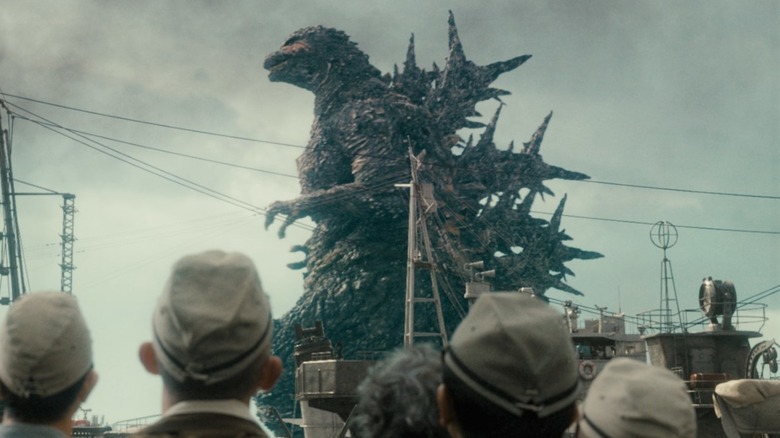How Old Is Godzilla? The King Of Monsters' Real Age, Explained
When you're the King of the Monsters, age is just a number. The original Godzilla film, 1954's "Gojira," premiered in Japan 70 years ago (as of this writing), but the kaiju with his name on the marquee is actually much older in canon. Because there have been so many different versions of Godzilla over the years — two American incarnations, various Japanese iterations, and even some animated ones, just to name a few — there's more than one answer to the question of Godzilla's actual age. However, the films have given us plenty of info over the years to make our own conclusions.
In his original incarnation and most versions since, Godzilla is thought to be a prehistoric creature who lived most of his life deep at the bottom of the sea before being awakened, disturbed, and-slash-or mutated by hydrogen bomb testing. Some theories suggest he's a Jurassic Age creature, which would make him about 200 million years old. Others place his origin in the Permian period, which would bump his age to around 250 million years. The latter is how Godzilla is portrayed in the MonsterVerse timeline and in some of the older Japanese films.
Of course, with such an ancient creature, it's impossible to pinpoint an exact age. If only Godzilla could talk in the movies, maybe he could tell us himself. Still, there have been some larger divergences from this prehistoric portrayal of the Kaiju King that make his age easier to accurately calculate.
Some Godzillas are younger than others
In the endlessly maligned (and rightfully so) 1998 box office bomb "Godzilla," the eponymous beast's prehistoric nature is changed significantly. Because the story is set in the late '90s, the writers weren't beholden to the same setup that propelled the original. Sadly, most of the changes they made, including the nature of Godzilla himself, have been widely scorned by franchise fans.
Rather than being a prehistoric monster awakened and summoned to the surface by a hydrogen bomb, the first American Godzilla is a mutated iguana transformed into a dinosaur-like creature by nuclear weapons testing. That means Zilla, as he has since been dubbed by Toho, only about 10 years old if we're going by the age range of typical iguanas. That makes the hated '98 version the youngest Godzilla to date, not counting the creature's various Japanese offspring like Minilla and Godzilla Junior.
Those latter two characters further complicate the Godzilla age conversation. Minilla hatches from an egg in 1967's "Son of Godzilla," but it's revealed he isn't Godzilla's biological child. While the elder monster adopts him, we don't get much concrete explanation for where the egg originally came from. The humans in the film are pretty certain that Manilla is a member of Godzilla's species, though. Godzilla Junior, who effectively replaces Minilla in the Heisei era of films, also hatches from a mysterious egg.
How does Godzilla live so long?
We've established that in pretty much every Godzilla movie, the big guy is between 250 million and 300 million years old. The next natural question is how he manages to survive for so long. As a fictional creature, Godzilla gets to play by a different set of biological rules, which is enough of an explanation for most. However, there's also some real-world science that might explain his impressive longevity.
Various species of reptiles and amphibians experience what scientists have dubbed "negligible senescence" — an apparent resistance to dying of old age. Senescence simply means an animal's natural pattern of aging. The normal trends of advanced age aren't as prevalent in certain species, including several turtles and salamanders. This is also true of some crocodiles and alligators, which typically don't die of old age, but rather of external causes.
Since Godzilla is always portrayed as a reptile or amphibian, it could be that some version of negligible senescence applies to him. Combine good genes with a diet of fish and radiation, plus a food chain with no natural predators, and you've got a recipe for a couple hundred million years of life. It's also worth noting that in some iterations, such as the MonsterVerse, Godzilla hibernates for substantial periods of time, which also certainly would play a role in his overall longevity.


